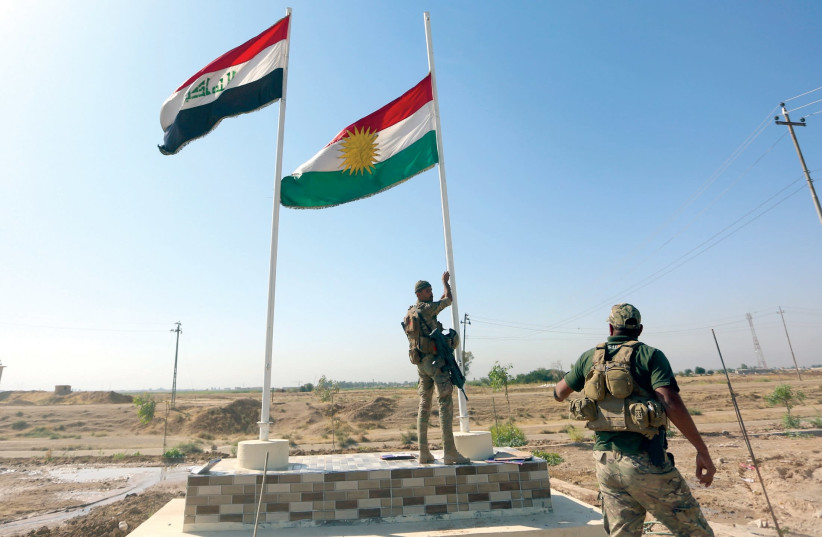The Kurdistan Regional Government is concerned that US-Iran tensions could result in a renewed rise of ISIS.
Iranian consulates in the autonomous Kurdistan region of Iraq held events to mourn Qasem Soleimani on Sunday. In both Erbil, the capital of the Kurdistan Regional Government (KRG), and Sulaymania, the consulates were opened for visitors.
A the same time, US Secretary of State Mike Pompeo has reached out to the Kurdish leadership in northern Iraq. He phoned KRG Prime Minister Masrour Barzani on Friday. The strategically important, economically significant and stable region of Kurdistan is now concerned about its difficult position between US policy and its neighbor Iran.
The Kurdistan region came into being in the 1990s in opposition to Saddam Hussein’s regime. It had common enemies in the Saddam regime with Iran and with the Shi’ites in southern Iraq. After the fall of Saddam, it initially worked closely with pro-Iranian parties that emerged in Baghdad.
However, the growing power of the sectarian government of pro-Iranian Nouri al-Maliki angered Erbil, which saw its autonomous role being potentially eroded. It also feared the rising instability of the mostly Sunni extremist groups that were fighting first the US and then the Iraqi government. That all exploded in 2014 as ISIS took over most of northern Iraq’s Sunni Arab cities, such as Mosul, and attacked the Kurds.
Iran was a key supporter of the Kurdistan region’s initial battles with ISIS in August 2014. Soleimani came to Erbil in 2014 and provided assistance against ISIS as part of his wider regional role fighting the jihadist group. However, by 2016, the Kurdistan region saw the rising tide of pro-Iranian militias, called Popular Mobilization Units, as a potential threat.
Groups like Qais Khazali’s Asaib Ahl al-Haq and Abu Mahdi al-Muhandis appeared to be not only abusing Sunnis, but were also anti-Kurdish. Khazali and others wanted to fight in Mosul and saw the battle in religious terms. Kurds opposed the participation of these groups in the Mosul battle, and then-president Masoud Barzani was able to make sure that only the Iraqi army and federal police passed through the Kurdish region for the Mosul battle.
The Kurdish region’s push for an independence referendum brought a crisis with Muhandis, Soleimani and the PMU. After the September referendum, the Shi’ite militias and Soleimani worked to remove the Kurdish forces from Kirkuk. In October 2017, they lowered the Kurdish flag from Kirkuk; clashes killed Kurds and members of the Shi’ite militias. It almost looked like civil war.
These two aspects of Kurdish-Iranian relations now overshadow events. The Kurdish leadership, particularly the Kurdistan Democratic Party, has had good relations with the US and the West.
The Patriotic Union of Kurdistan (PUK) has good relations with Iran, the UK and also the US. These parties try to hedge between their powerful Iranian neighbor and their preference for having a stable Kurdistan region that works with the US and Western governments. Washington and the coalition have supported the Kurdish Peshmerga, the security forces of the KRG, to train them and fight ISIS.
This is ongoing work. The US and the coalition also have forces at a base in Erbil. This is important for fighting ISIS and keeping the area secure.
POMPEO SAID that he spoke to Barzani about the US decisions in Iraq and America’s commitment to “de-escalation.” He thanked the Kurdish region for steadfast partnership. Now Iran is mourning Soleimani and thinking how to respond. The Kurdistan region is in the middle. It has important trade relations with Turkey. It plays a role in supplying the coalition in eastern Syria.
It is hosting hundreds of thousands of refugees from across Iraq, including Sunnis who fled the PMU, Yazidis who fled ISIS and Kurds from Syria who fled the Turkish offensive in October. US Vice President Mike Pence visited the Kurdish region in November to reassure its leaders, including KRG President Nechirvan Barzani.
The KRG is concerned that US-Iran tensions could result in a renewed rise of ISIS. It has called for a right to protest for those demonstrating in Iraq over the last months but has been careful not to pressure Iraqi Prime Minister Adel Abdul Mahdi, who resigned during the protests. It now must tread carefully amid US-Iran tensions. The KRG says it rejects any attempt of foreign countries to settle scores in Iraq. It also noted Soleimani’s important role fighting ISIS.
The KRG’s political parties are now concerned about a vote in Iraq’s parliament that seeks to expel US forces from the country. Kataib Hezbollah and other anti-US militias have threatened Iraqi MPs who don’t attend the vote on Sunday. It is unclear if Kurdish MPs will attend or how they will vote. If they vote against expelling US troops, it will lead to criticism by pro-Iran parties. If they vote for it, then they will potentially lose US support.
If they simply don’t show up, they will also be criticized. The Kurdish region in Iraq often finds itself attacked from both sides, as during its 2017 referendum. The US has opposed the region’s referendum but demands its loyalty on other fronts. Pro-Iran groups also demand the Kurdish region support them.
Whatever the region does, it will be critiqued. If it works with Baghdad, then it is critiqued for cynically working with Baghdad. If it doesn’t work with Baghdad, it is accused of not supporting the unity of Iraq. For the US, Iran, Turkey and other countries.
Erbil has also become an important strategic meeting place for the region, a kind of hinge on which the Middle East turns. Now, once again, the region will look to the Kurds as they are forced to find a middle way between the US and Iran.

